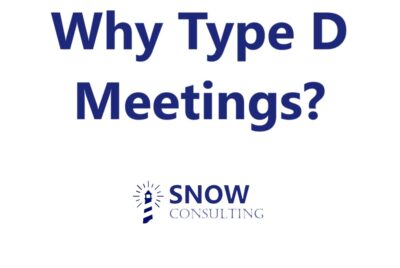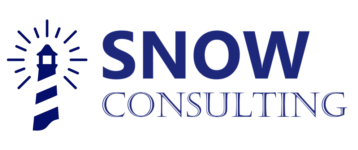Type D FDA meetings: ‘D’ is for ‘Details’ for successful meetings
Snow Consulting provides our Comprehensive Guide on “Delving into a Type D FDA meeting”
Delving into Type D FDA Meetings: A Comprehensive Guide
The landscape of FDA meetings has evolved significantly with the advent of the ‘Type D’ meeting format under PDUFA VII, effective from October 1, 2022. This innovative format aims to streamline interactions between sponsors and the FDA, making the process faster and more straightforward. For stakeholders keen on leveraging this new format, understanding its features, requirements, and potential challenges is essential. Join us as we navigate the intricacies of Type D meetings, drawing from our experiences and offering actionable tips for success.
Summary Highlights of Type D FDA Meetings:
- A meeting focused on a narrow set of issues- No more than 2 focused topics.
- A meeting that should require input from No more than 3 disciplines or Divisions.
- Asking a follow-up question after a formal meeting.
- Getting feedback on a specific topic.
- Asking a broad question about an innovative advancement.
FDA Response Time:
The FDA has updated the draft guidance titled “Formal Meetings Between the FDA and Sponsor or Applicants of PDUFA Products” in September 2023, incorporating details on Type D and INTERACT meetings. According to the PDUFA VII commitment letter,
Type D meetings are particularly suited for scenarios such as:
- Follow-up questions after a formal FDA meeting introducing new topics beyond mere clarification.
- Seeking FDA feedback on specific, limited topics with a few related questions.
- Presenting broad queries on innovative advancements not requiring comprehensive guidance.
Since its introduction, Snow Regulatory Affairs Consulting has actively engaged with numerous sponsors to facilitate Type D meetings, whether through written responses (WRO) or teleconferences. Senior Snow Regulatory Affairs Consulting Regulatory Specialist Susan Snow notes, “Type D meetings have demonstrated their effectiveness as a valuable platform for obtaining targeted information efficiently. This approach has already provided benefits to companies of all scales.” Leveraging our recent engagements, we offer essential insights to accelerate FDA feedback and mitigate possible delays.”
Differentiating Type D from Type B or C FDA Meetings:
- Scope and Complexity: Type D meetings focus on specific, limited topics that do not necessitate involvement from more than three FDA disciplines or Divisions. This differs from Type B meetings, which address complex issues requiring input from multiple disciplines, and Type C meetings, primarily used for general guidance without specific data or development plans.
- Meeting Preparation: Successful Type D meetings hinge on meticulously structured meeting requests and concise background materials. It is imperative to ensure that questions and supporting documentation align with Type D criteria to prevent requests for additional information or a shift to a different meeting type, which could cause delays.
- Flexibility and Timeliness: Type D meetings offer a quicker turnaround for obtaining FDA feedback compared to Type B or C meetings. This agility is advantageous for sponsors seeking rapid clarification on specific issues without delving into broader regulatory discussions. However, sponsors must remain adaptable should the FDA recommend transitioning to another meeting type based on question complexity or scope.
Practical Strategies for Conducting Type D Meetings:
- Define Your Disciplines: To qualify for a Type D meeting, limit your meeting request to involve no more than three FDA disciplines or Divisions cumulatively. Understanding which disciplines are essential for your questions ensures alignment with Type D criteria.
- Strategic Background Documentation: Submit a comprehensive yet succinct background package that addresses questions thoroughly while remaining within the scope of Type D requirements. This balance is critical to maintaining eligibility and expediting the review process.
- Prepare for Alternatives: Should the FDA deem your questions more suited to Type B or C meetings, be prepared to adjust your strategy. This may involve withdrawing the Type D meeting request and submitting a new request accompanied by additional documentation tailored to the new meeting type.
Ready to ‘Delve’ into a Type D FDA meeting discussion? Click Here now
While Type D meetings offer a streamlined path to obtain prompt feedback on specialized topics, adherence to FDA guidelines and thoughtful planning are paramount. Sponsors should adopt a comprehensive approach, anticipating the necessary FDA disciplines for thorough assessment and framing questions clearly. Prior to committing to a Type D meeting, careful evaluation of primary issues requiring clarification is advised, with contingency plans in place if the FDA recommends an alternative meeting format.
 Snow Regulatory Affairs Consulting has submitted multiple Type D Meeting requests including the following sample:
Snow Regulatory Affairs Consulting has submitted multiple Type D Meeting requests including the following sample:
- Type D meeting to obtain Agency feedback on the addition of proof-of-concept cohorts for post anti-PD-(L)1 non-small cell lung cancer (NSCLC) and post anti-PD-(L) 1 small cell lung cancer (SCLC)
-
-
-
-
-
-
- Type D meeting to obtain Agency feedback on dose optimization cohorts
- Type D meeting to obtain Agency feedback on the design of the 13-week repeat-dose toxicity study in cynomolgus monkeys to support the Phase 3 trial and marketing application.
-
-
-
-
-
-
Curious to delve deeper into Type D FDA meetings?
Click here to engage with our regulatory experts and explore how this format can benefit your development strategy.
It All Starts With a consultation!
We look forward to discussing your needs with you!
For any kind of Regulatory Affairs inquiries, Please call
tim@gotresults.net
